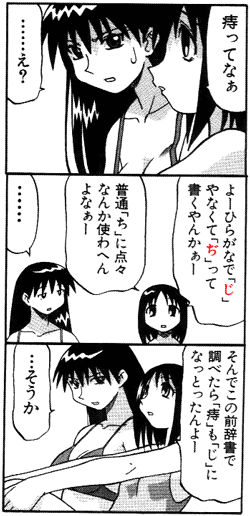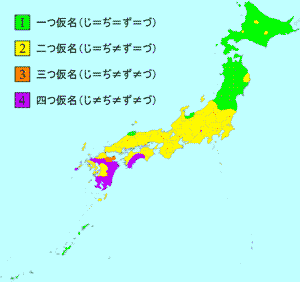In Japanese, yotsugana 四つ仮名 refers to ji じ, di ぢ, zu ず, and dzu づ. These "four kana 仮名," were originally pronounced distinctly, but in modern Japanese, in some regions of Japan, they're all pronounced the same way, they've become homonyms.
Usage
The usage of the yotsugana can be divided according to how many distinct sounds exist among the four characters. There are regions in Japan where:
- All characters have the same one sound.
- ji じ is di ぢ, and zu ず is dzu づ.
- ji じ is di ぢ, but zu ず isn't dzu づ.
- All four characters sound different.
In standard Japanese, used in Tokyo, where most anime comes from, and most anime characters live in, there are only two sounds: ji じ, or di ぢ and zu ず, or dzu づ. This also applies to the Kansai region, by the way, which some anime characters come from.
That's basically the only one that we really care about. Nobody really cares how it's pronounced in Kagoshima or Okinawa.
I mean, do you even realize where Okinawa is? Okinawa is the Hawaii of Japan. It's closer to Taiwan than it's to Tokyo. Of course the Okinawan dialect is going to sound a little different from the language spoken in the capital, that's to be expected.
Orthography
Orthographically, the characters are different, even though the pronunciation is exactly the same in some parts of Japan.
That is, if a word has dzu づ, and you use zu ず instead, you're misspelling it. Even though they sound the same, you're supposed to use the correct character.
This eludes even natives, who sometimes misspell ~dzurai ~づらい as ~zurai ~ずらい, for example.
It may sound like a pain to memorize, but in reality there aren't that many words with di ぢ or dzu づ in them, so it's not really a problem. Most words only have ji じ and zu ず.
When di ぢ and dzu づ do appear in a word, it's usually because the dakuten 濁点 is added due to rendaku 連濁, for example:
- chi
血
Blood. - hanadi
鼻血
Nosebleed. - tsukeru
付ける
To attach. (among other meanings.) - katadzukeru
片付ける
To clean up. - tsurai
辛い
Harsh. - ii-dzurai
言いづらい
Hard to say.
They also appear in words where the same sound is repeated, but the repetition is voiced. For example:
- tsudzuku
つづく
続く
To continue. - chidimu
ちぢむ
縮む
To shrink.
Historically, the four kana were more distinct, and gradually they've merged with each other in certain parts of Japan, whereas other parts didn't merge them.
It's possible that in the future the whole country is going to stick to just one way to pronounce them, whether with one sound, two sounds, three or four, but that's not case as of right now yet.
- di tte naa
痔ってなぁ
Hemorrhoids, [you know]. - ......e?
・・・・・・え?
......huh? - yoo hiragana de "ji"
yanakute "di" tte
kaku yankaaa
よーひらがなで「じ」やなくて「ぢ」って書くやんかぁ
- yoku hiragana de "ji"
janakute "di" tte
kaku janai ka
よくひらがなで「じ」じゃなくて「ぢ」って書くじゃないか
Often, it's spelled with hiragana not as "じ" but as "ぢ" isn't it?
- yoku hiragana de "ji"
- futsuu "chi" ni tenten
nanka tsukawahen yo naaa
普通「ち」に転々なんか使わへんよなぁー
Normally you don't add dots to "ち", right?- tenten 点々
Dots.
The diacritic (゛).
- tenten 点々
- sonde kono mae jisho de
shirabetara "di" mo "ji" ni
nattotta-n-yoo
そんでこの前辞書で調べたら「痔」も「じ」になっとったんよー
So, the other way [I] checked the dictionary and "痔" had became "じ". - ...sou ka
・・・そうか
[I see].
In the panel above, a character talks about how the word di 痔, "hemorrhoids," which was originally spelled as di ぢ, had its spelling in the dictionary recently changed to ji じ. Also note that she points out you don't normally add a diacritic to chi ち.
Romanization
The romaji of the four kana differ across romanization systems.
In the nihon-shiki system, which is highly regular, they become:
- sa-si-su-se-so
さしすせそ - za-zi-zu-ze-zo
ざじずぜぞ - ta-ti-tu-te-to
たちつてと - da-di-du-de-do
だぢづでど
In Hepburn, which is based on the pronunciation, they become:
- sa-shi-su-se-so
さしすせそ - za-ji-zu-ze-zo
ざじずぜぞ - ta-chi-tsu-te-to
たちつてと - da-ji-zu-ze-zo
だぢづでど
In other words, in modern Hepburn, the romaji mimics standard Japanese pronunciation, where there are only two sounds, and therefore only two romanizations, ji and zu, for the four kana.
Personally, I don't use these romanizations in this blog, I use di and dzu, because I use romaji as an alternative to furigana, and that doesn't work if one romaji ambiguously represents two different kana.
References
- 四つ仮名 - ja.wikipedia.org, accessed 2019-11-19.


No comments: